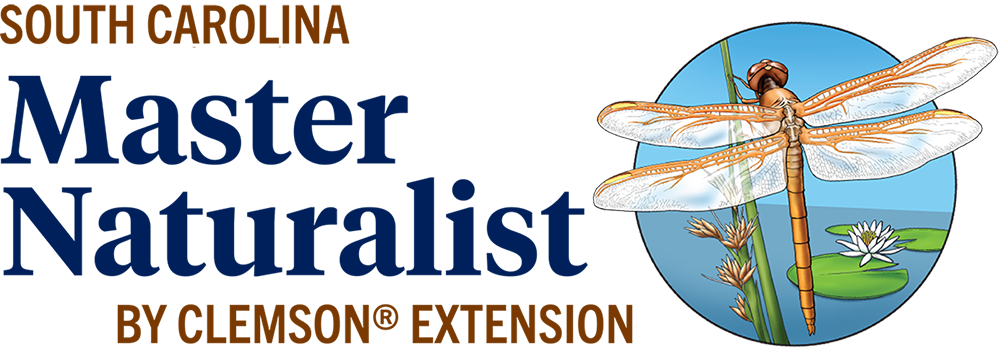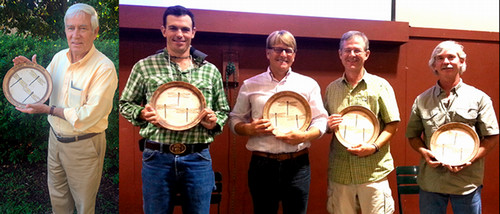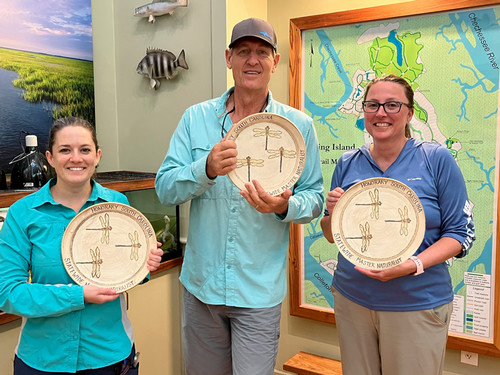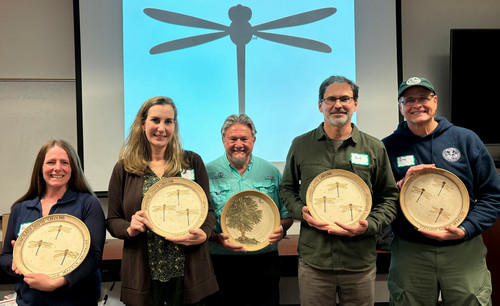Becoming a Master Naturalist
The South Carolina Master Naturalist Program is currently offered through six Host Site locations around the state of South Carolina. Information on the classes offered can be found by the individual class pages. These field-based training sessions typically last 12 weeks, meeting all day, one day per week.

Advanced Training
Advanced training is offered by Host Sites throughout the state and by the State MN Office specifically to provide additional training for Master Naturalists in different biogeographical regions. Eight (8) hours of advanced training are required each year as part of the volunteer service requirement.
Required Paperwork
All participants who go through SC Master Naturalist training at our various Host Sites around the state are required to complete certain paperwork. Generally, this paperwork is completed on the first day of class, or the Host Site may direct you to download, complete, and bring the completed forms with you to the first class.
-
SC Statewide Master Naturalists
The following SC Master Naturalists have earned the designation of SC Statewide Master Naturalist since it was implemented in 2014:
2014 - Linell Goodall, Hilda Flamholtz, Kathy Burriss, Dan Whitten, Carl Cole, Barbara Watson, Nancy Thompson, Judith Kramer, Jimmy Watson, Tom Pray, Terri Mendonca, Dr. James H. Blake
2015 - Sue Williams, Gina Varat, Sanna Schantz, Pam Barbour, Jean Arden, Polly Powell, Patsy Winkel, Susan Hamilton, Sherrie Whitten, Ray Wade, Bobbie Wilhite, Rick Keup, Ric Barnett, Carol Ulmer, Pam Floyd, Anne Palyok
2016 - Craig Williams, Dale Hutto, Bill Altman, Wally Niebauer, Ellie Elzerman, Bill Thielfoldt, Liesel Hamilton, Dee Dee Williams, Elizabeth Anderegg, Susan Lech, Jimmy Vissage, Ray Ward, Nicole Riddle, Tricia Kyzer, Yvonne Plemmons
2017 - Mike Patrick, Charlotte Morley, Elizabeth Rockholt, Carla Kneece, Sharon Watson, Ted Kalutz, Gail Rahn, Sheryl Waldvogel, Ed Neunlist, Bob Senn, Dennis Blejski, Ray Long, Mary Campbell, Buddy Campbell, Bob Askins, Alice Fraser, Mike Davis
2018 - Cindy Hekking, Linda Rowe, Greg Campbell, Gina Elliott, Jessica Miller, Bill Putnam, Flora Doraski, Joe Doraski, Bob Brouillet
2019 - Jenna Stephens, Pam Shroyer, Kenneth McDowell, Scott Wietecha, Chris Rucker, Dave Ziner, Andy Chesson, Mary Burnett, Rick Calvert, Lee Morris, Tara Boone, Meg Filiatrault, Phil Filiatrault, Dennis DeFrancesco, John O'Connell, Joanne Panek, Anthony Panek, Pat Pierce, Rosanne Maraziti
2020 - Susan Luberoff, Eleanor Ellison
2021 - Dave Eslinger
2022 - Charlotte McCreary, Brian Grabbatin, Linda Parker, Brandy Cloos, Theresa Higgins, Michael Jones
2023 - Mallory Maher, Pat Martin, Greg Labyak, Johnny Wong, Carson Johnson
2024 - Gail Brownlee, Kathy Edwards, Rob Gentry, Charlotte Wiedenman, Bill Hollingsworth, Janine Probst, Elizabeth Zembry, Betsy Lewis, Pam Shucker, Melissa McDow, Captain Bill Parker
2025 - Vernon Peers, Judy Fairchild, Barbara Key, Debra Garrett, Tami Kyre, Steve Lewis, Renee Gracon, Kim Rozelle, Patrick Markham, Jean Fontaine, Steve Clark, Laura Godfrey, Tony McDade, Cam McDade, Cynthia Spratley
2026 - John Martin, Tracy Nunnery, Deborah Hill, El Nault, Mary Villmow, Will Mundhenke, Caroline Hewett
-
Honorary Statewide SC Master Naturalists
In 2015, the SC Master Naturalist Program implemented a recognition called Honorary Statewide SC Master Naturalists to recognize individuals who contributed significantly to the natural world in the state of South Carolina.
The inaugural Class of 2015 Honorary Statewide SC Master Naturalists included Rudy Mancke (University of South Carolina), Austin Jenkins (USC Sumter), Patrick McMillan (Clemson University), Chris Marsh (The LowCountry Institute), and Tim Lee (SC State Parks).
The 2022 Class of Honorary Statewide SC Master Naturalists included Kristen Marshall Mattson (The LowCountry Institute), Tony Mills (The LowCountry Institute) and Jen Plunket (University of South Carolina).

The 2024 Class of Honorary Statewide SC Master Naturalists included Kristina Wheeler (Charleston County Parks), Sara Green (SC Wildlife Federation), Keith McCullough (Charleston County Parks), and Greg Lucas (SC Department of Natural Resources), pictured with retiring State Director of the SC Master Naturalist Program James H. Blake (center).

Each recipient received a personalized dragonfly plate by claysmith Rob Gentry of Pendleton, SC.
Certification Levels
SC Master Naturalist
Complete a 12-week SC Master Naturalist course plus 22 hours of volunteer service and 8 hours of advanced training.
Volunteer service hours and advanced training must be entered into the Master Naturalist Online Volunteer Hour Reporting System.
SC Statewide Master Naturalist
To become a Statewide Master Naturalist you must complete the above as well as:
-
Step 1: Complete 32 Hours of Additional Advanced Training
You must complete 16 hours of advanced training in each of two (2) additional SC biogeographical regions.
Each host site has class sessions in two biogeographical regions. In order to earn advanced training hours towards the SC Statewide Master Naturalist certification, you must go outside of those two regions for your advanced training.
For more information visit our Biogeographical Regions page.
Advanced training hours must be entered into the Master Naturalist Online Volunteer Hour Reporting System.
-
Step 2: Complete the Interpretation Course
After your trainings you must also complete the 6-hour Advanced Training - Interpretation for the Master Naturalist offered by the State Master Naturalist Office or an interpretation course approved by the State Coordinator.
This is a stand-alone course and does not count towards the 32 hours of advanced training in the two biogeographical regions or your yearly 8 hours of advanced training to maintain your Master Naturalist certification.
South Carolina Statewide Master Naturalists are recognized by an emerald placed in the first jewel location on the Master Naturalist name tag.
Name tags must be sent to the State Office, where certification will be verified from the Online Volunteer Hour Reporting System and the emerald awarded.
Training hours must be entered into the Master Naturalist Online Volunteer Hour Reporting System.

